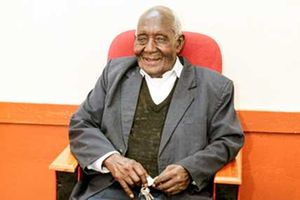
Alpha House, formally Imani House, on Ronald Ngala Street in Nairobi.
The multi-billion-shillings property that "Rwathia boys" investment groups from Murang'a have built for decades in Nairobi is now threatened by poor succession plans as younger family members and associates increasingly take control.
The investments started in the city by young men initially from Rwathia village in Mathioya Constituency grew steadily from the colonial era — some as early as the 1920s — and are today estimated to have a combined value of more than Sh500 billion in Nairobi and beyond, according to one of the group’s directors Mr Kanene Kabiru, who cites a recent official valuation.
He said the lowest valued property in the “Murang'a empire” is Sh40 million while the highest is worth Sh380 million, according to an official valuation done in 2023.
“The hundreds of investments are owned by families in Kangema, Gatanga Kigumo and Mathioya constituencies," he told Nation.Africa, pointing to the diversity of the investments.
Mr Kabiru added: "While it is possible to identify the properties, compiling the list of beneficiaries is an impossible task given that most of them are now in the hands of the third generation".
The assets are in the form of buildings, land, hospitality businesses and cash in hand. They are investments that started with young men moving from Murang'a to try their luck in the city in the late 1920s.
While the run was good during the time the founders were active, the succession plans in the investment groups have never been enacted and, with time, feuds by members, family tussles and general confusion have set in to crumble the joint ownerships.
So serious is the issue that Cooperatives Cabinet Secretary Wycliffe Oparanya, on a tour of Mathioya Constituency on September 24, 2024, said, "This is home to a case study of what cooperatives can do to wealth creation but serious managerial flaws in the sector are now raising serious questions".
"We are now at the phase where structural management policies must be enacted to provide for a smooth transition into generations".

Accra Hotel along Accra Road in Nairobi.
The initial plan, Mr Kabiru said, was that groups of about 10 people would pool resources together – between Sh100 and Sh200 single shares – to purchase buildings that Asians were leaving behind as the Mau Mau war raged and in the post- independence period.
"The interested village men would sell off parts of their land and livestock to raise the shares. Others were trading in charcoal, firewood and timber. They would send the money to the pioneer formulators of the plan who were scrambling for Nairobi on their behalf to launch the joint investments," Mr Kabiru said.
The members invested in hotels, bars and lodgings and, as a free country set in following the fall of the colonialists, the investors managed to pool together an economy of their own.
The biggest problem in the joint investments was that the founders were bound to grow old and die, indeed by now, none of the principal members is alive.
The last principal founder to die was Mr Gerald Gikonyo (1914-2024) who died at the age of 110 years.
According to Mr John Kamau, 85, from Wanjerere village, his grandfather was among the founder members of about 10 investments in the capital city.
"All those founders believed in big families, that’s why they were polygamous. Once they died, their shares would be inherited by their families," he said.
Mr Kamau said it was relatively easy for the surviving wives to agree on how they would split the dividends the investments were fetching.
"However, the children in those polygamous families started bringing in complications. You would find that, for example, a family was entitled to say, Sh100,000 annual dividends. But all the wives in the family had varying numbers of children who would demand that they were entitled to an equal share," he told Nation.Africa.
Mr Kamau added: "The money started generating family wars, especially because of the levels of education and comprehension. In some cases, those who were not well schooled were kept in the dark about the gains in the businesses."
By the time the investments reached the third generation, it was technically impossible to keep track of the shareholders’ list.
"This brought in the aspect of greed, manipulation, graft and boardroom coups, ushering in an era of court cases," said Mr Stephen Kamanu, 56.
"Today, most of the investments are only there on paper since they are registered by our villages' names, but how the gains are shared out has no formula… no known criteria in most instances".
Numerous interviews in many families indicate that there is no known formula for convening Annual General Meetings to get financial reports.
"For instance, what I know is that my grandfather was a founder member and they had a jointly owned commercial building in the Central Business District area of the capital city.

Athusi Bar and Restaurant.
From the initial 12 members, today we are about 287 beneficiaries," said Mr Bedan Kang'ethe from Mihuti village.
He said that during the Covid-19 pandemic, most members did not receive a single penny from the businesses.
"The highest amount that I have received per year was Sh175 in 2008. Most of the years we go without receiving anything and there is nothing we can do since we are not even the entitled owners of the businesses," he said.
Mr Kabiru said the joint businesses can only fully benefit those families that while in the joint ventures, acquired their own buildings and land detached from group ownerships.
"Those families have continued to track their investments owing to the small number of beneficiaries. But those families that grew in population while relying on the shares of their founding members cannot technically benefit," he said.
Others are those families that planned, invested in education and remained united. They subsequently placed their businesses in the hands of professional managers and enacted a sharing formula.
He said some other families that are cohesive are now coming together and selling off those properties and sharing the money amongst themselves.
Mr Kabiru says he knows of a family that in 2022 sold off a property worth Sh50 million and shared the windfall among 73 members, each getting about Sh620,000 after all expenses were deducted.
"That is one family that was helped by its ability to mutually agree to sort itself out of the mess that we have become. Unfortunately, many families won't even agree on how they are related with the founding fathers of the investments, let alone how to benefit from the properties," he said.
Mr Kabiru added that most politics revolves around the validity of matrimony, proof of genetic relations, the place of women in the benefits expected, as well as representation in business meetings.
"It would have been easier to manage these group investments had we found in place a formula of succession by way of renewing shares where the ageing founders sold off their holdings to members of their families or even those from outside," he added.
This, Mr Kabiru says, would have been smoothly transferring the assets and gains to newly known members.
"But what we have today are families that did not even find their principal founder alive claiming to be entitled to the estates without investing a single coin," he said.
Ms Patricia Mugure 53, says she is a member of a family that owns about six high-rise buildings in Nairobi.
"We are about 108 in this family. Some are children of single mothers in this family. The politics around sharing benefits are about lineage. Women are excluded. Those born out of wedlock are also excluded. But some of the women and those not of our bloodline have filed court cases demanding to be recognised as heirs," she said.
In the courts, the biggest challenge they face is proving ownership and validity of claims hence stalling succession through petitions and court orders.
"We cannot even get managers from families to go and manage the properties because we cannot even agree on whose son will be appointed. All families want representation, to mean one building having not less than 50 managers," Ms Mugure said.
"The only positions that do not attract politics are those of watchmen and cleaners since the jobs are not in high demand".









